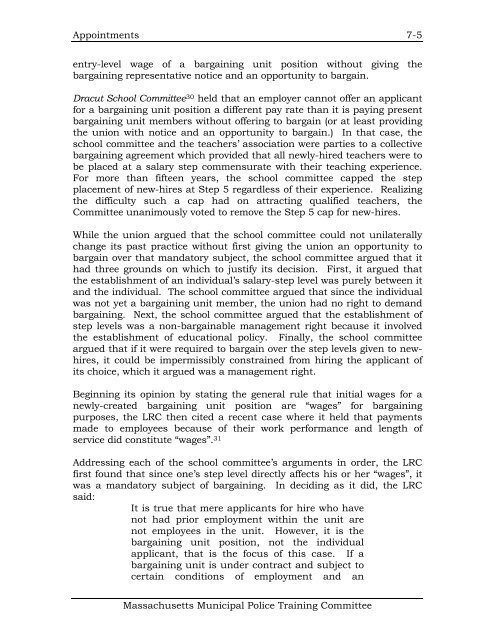Management Rights - AELE's Home Page
Management Rights - AELE's Home Page
Management Rights - AELE's Home Page
Create successful ePaper yourself
Turn your PDF publications into a flip-book with our unique Google optimized e-Paper software.
Appointments 7-5<br />
entry-level wage of a bargaining unit position without giving the<br />
bargaining representative notice and an opportunity to bargain.<br />
Dracut School Committee 30 held that an employer cannot offer an applicant<br />
for a bargaining unit position a different pay rate than it is paying present<br />
bargaining unit members without offering to bargain (or at least providing<br />
the union with notice and an opportunity to bargain.) In that case, the<br />
school commitee and the teachers’ association were parties to a colective<br />
bargaining agreement which provided that all newly-hired teachers were to<br />
be placed at a salary step commensurate with their teaching experience.<br />
For more than fifteen years, the school committee capped the step<br />
placement of new-hires at Step 5 regardless of their experience. Realizing<br />
the difficulty such a cap had on attracting qualified teachers, the<br />
Committee unanimously voted to remove the Step 5 cap for new-hires.<br />
While the union argued that the school committee could not unilaterally<br />
change its past practice without first giving the union an opportunity to<br />
bargain over that mandatory subject, the school committee argued that it<br />
had three grounds on which to justify its decision. First, it argued that<br />
the establishment of an individual’s salary-step level was purely between it<br />
and the individual. The school committee argued that since the individual<br />
was not yet a bargaining unit member, the union had no right to demand<br />
bargaining. Next, the school committee argued that the establishment of<br />
step levels was a non-bargainable management right because it involved<br />
the establishment of educational policy. Finally, the school committee<br />
argued that if it were required to bargain over the step levels given to newhires,<br />
it could be impermissibly constrained from hiring the applicant of<br />
its choice, which it argued was a management right.<br />
Beginning its opinion by stating the general rule that initial wages for a<br />
newly-created bargaining unit position are “wages” for bargaining<br />
purposes, the LRC then cited a recent case where it held that payments<br />
made to employees because of their work performance and length of<br />
service did constitute “wages”. 31<br />
Addressing each of the school commitee’s arguments in order, the LRC<br />
first found that since one’s step level directly afects his or her “wages”, it<br />
was a mandatory subject of bargaining. In deciding as it did, the LRC<br />
said:<br />
It is true that mere applicants for hire who have<br />
not had prior employment within the unit are<br />
not employees in the unit. However, it is the<br />
bargaining unit position, not the individual<br />
applicant, that is the focus of this case. If a<br />
bargaining unit is under contract and subject to<br />
certain conditions of employment and an<br />
Massachusetts Municipal Police Training Committee
















